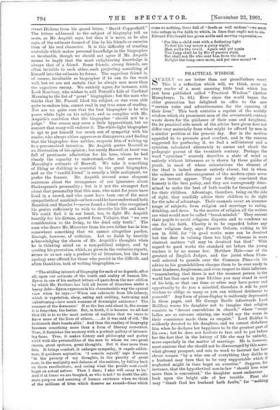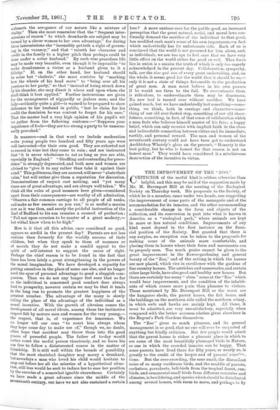PRACTICAL WISDOM.
SURELY we are better than our grandfathers were! This is a reflection which will, we think, occur to every reader of a most amusing little book which has just been published called "Practical Wisdom" (Arthur Humphreys, 7s. 6d.) Ever since the world began the older generation has delighted to offer to the new "certain rules and advertisements for the squaring of their lives." This book contains a reprint of the worldly wisdom which six prominent men of the seventeenth century wrote down for the guidance of their sons and daughters. On its practical side much of the advice here given does not differ very materially from what might be offered by men in a similar position at the present day. But in the motives appealed to to promote good conduct, and in the reasons suggested for preferring it, we find a self-interest and a cynicism calculated alternately to amuse and shock the pedagogic parent of the twentieth "century. Perhaps the word " cynicism " scarcely describes a state of mind so entirely without bitterness as is shown by these guides of youth, in most of whose exhortations the element of• the ideal is indeed almost entirely absent, but in whom the sadness and discouragement of the modern cynic never for an instant appear. They are firmly convinced that honesty is the best policy, and they are courageously deter. mined to make the best of both worlds for themselves and for their children. Advantage, therefore, being on the side of right, they candidly advise their children to do right for the sake of advantage. Their counsels cover an immense range of subjects, from religion and marriage to eating, drinking, and dress. In the matter of religion all the writers are what would now be called "broad-minded." They entreat their pupils to avoid religious disputes and to condemn no one for his faith. Charity is to be regarded before any other religious duty, says Francis Osborn, writing to his son in 1656, for "in good works none can be deceived but the doer in valuing them too high," whereas in more abstract matters "all may be deceived but God." With regard to good works the standard set before the young readers is by no means low. Matthew Hale—one of the greatest of English Judges, and the jurist whom Crom- well selected to preside over the Common Pleas—in his advice to his grandchildren charges them to be ever ready to show kindness, forgiveness, and even respect to their inferiors, "remembering that there is not the meanest person in the world but that once in your lifetime you may stand in need of his help, or that one time or other may have power and opportunity to do you a mischief, therefore it will be your wisdom to oblige as many as you can without detriment to yourself." Any form of pious display is uniformly deprecated in these pages, and Sir George Savile (afterwards Lord Halifax) warns his daughter not to imagine that religion consists in "devout convulsions in church," where "many
ladies are so extreme stirring, one would say the worm in their conscience made them so unquiet." Lord Halifax is evidently devoted to his daughter, and we cannot disbelieve him when he declares her happiness to be the his own; but he does not hesitate to face and to put before her the fact that in the lottery of life she may be unlucky, greatest part of more especially in the matter of marriage. He is, however, most anxious that she should not be discouraged by this some- what gloomy prospect, and sets to work to instruct her how clever women "by a wise use of everything they dislike in a husband may turn that to be very supportable which if neglected might in time beget an aversion." Suppose, for instance, that the hypothetical son-in-law "should love wine more than is convenient," the daughter must endeavour look upon the bright side of her trouble. First she may "thank God her husband hath faults," for "nothing
softeneth the arrogance of our nature like a mixture of frailty.° Then she must remember that the " frequent inter- missions of reason" to which drunkards are subject may be turned by a clever woman to her own advantage," for during these intermissions she "insensibly getteth a right of govern- ing in the vacancy," and that " raiseth her character and credit in the family to a higher, pitch than perhaps could be done under a sober husband." By such wise procedure life may be made very bearable, even though it be impossible "to make drunkenness a virtue or a husband given to it a felicity." If, on the other hand, • her husband should be sober but "choleric," she must contrive by "marking how the wheels of his head move" to "bring over all his passions to her party," so that "instead of being struck down by his thunder, she may direct it where and upon whom she sball think it best applied." Further instructions are given for the management of niggardly or jealous men; and the lady—evidently quite a girl—is warned to be prepared to show deference to her husband in public, "lest he claim for his credit the dominion he was content to forget for his ease." That the master had a very, high opinion of his pupil's wit we gather from the following sentence :—" Suppress your impatience of fools—they are too strong a party to be unneces. Barfly provoked."
In manners—and in that word we include moderation —the young people two hundred and fifty years ago were well instructed—for their own good. They are exhorted not to exceed in wine lest they come to ruin ; and are instructed that "it is never wholesome to eat as long as you are able, especially in England." "Shuffling and contending for prece- dence" is strongly deprecated, and both men and women are advised to "give it to any rather than take it against their mind." This politeness, they are assured, will never "abate their value," but will rather give them a reputation for discretion. Demonstrations of respect cost nothing, and "yet many times are of great advantage, and are always well taken." We think all the rules of good manners here given—considered apart from their consequences—are worthy of all admiration. "Observe a fair common carriage to all people of all ranks, and make as few enemies as you can," is as useful a maxim now as it was then, and surely the prideful instruction of the Earl of Bedford to his son remains a counsel of perfection: "Fail not upon occasion to be master of a great modesty,— but withal know when to be high."
How is it that all this advice, once considered so good, appears so sordid in the present day? Parents are not less anxious than formerly for the worldly success of their children, but when they speak to them of manners or of morals they do not make a candid appeal to the spirit of self-interest to support the cause of right. Perhaps the chief reason is to be found in the fact that there has been lately a great strengthening in the powers of the moral imagination. We have developed a capacity for putting ourselves in the place of some one else, and no longer need the spur of personal advantage to goad a sluggish com- passion. Then we do not any longer feel sure that so far as the individual is concerned good conduct does always lead to prosperity, however certain we may be that it tends in the long run to promote the greatest happiness of the greatest number. The advantage of the many is slowly taking the place of the advantage of the individual as a moral incentive. With the growth of altruism comes the development of all moral ideals, among them the instinctive respect felt by mature men and women for the very young,— the respect, that is, of experience for innocence. We no longer tell our sons "to court him always whom they hope some day to make use of," though we, no doubt, often hope that accident may throw them into the good graces of powerful people. The father of to-day would rather court the useful person vicariously, and so leave his son free to follow a disinterested course in the matter of friendship. It is still well within the bounds of possibility that the most cherished daughter may marry a drunkard, hut nowadays a man who loved his child would hesitate to map out before her all the miseries of a hypothetical situa- tion, still less would he seek to induce her to ease her position by the exercise of a somewhat ignoble shrewdness. Certainly We have made a great advance since the middle of the seventeenth century, nut have we not also sustained a certain loss ? A more anxious care for the public good, an increased perception that the great natural, social, and moral laws con- tinually demand the sacrifice of the individual to that good, has modified each man's sense of his own importance,—a fact which undoubtedly has its unfortunate side. Each of us is convinced that the world is not governed for him alone, and, as individuals, we are too apt to feel sure that we have very little effect on the world either for good or evil. That force lies in union is a maxim the truth of which is only too eagerly acknowledged in the present day. Collaboration, sympathy, talk, are the sine qua non of every great undertaking, and, on the whole, it seems good for the world that it should be so,— only it is not a state of things favourable to the production of great men. A man must believe in his own powers if he would use them to the full. To overestimate them is ridiculous, to underestimate them may be disastrous. No new leaf is turned over without sacrifice. We have gained much, but we have undoubtedly lost something—some- thing, we think, both in carriage and character—some- thing of our old sure-footed step, something of our old cheer- fulness, something, in fact, of that sense of exhilaration which a man feels who believes himself master of his fate; a happy belief, which can only co-exist with implicit faith in the close and indissoluble connection between virtue and its inimediate, earthly, and personal reward. The men and women of the seventeenth century could not have been got to understand Archbishop Whately's gloss on the proverb, "Honesty is the best policy, but he who is honest for that reason is not an honest man." They would have considered it a mischievous destruction of the incentive to virtue.











































 Previous page
Previous page